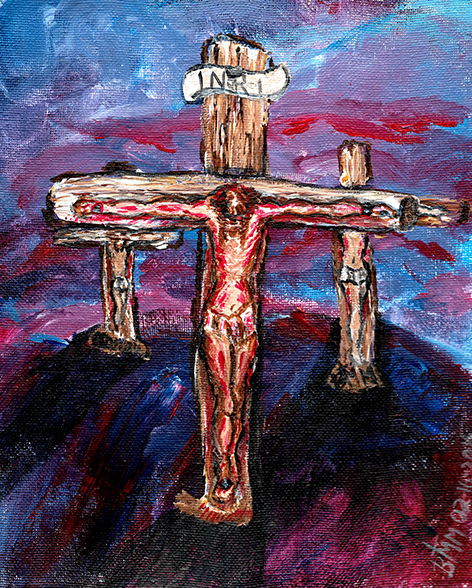I preach it, I teach it, and I believe it. Abundance is your birthright, not because some New Age guru said so, but because Christ told us, “I am come that they may have life, and may have it more abundantly.” – John 10:10
Yet lately, it’s looked to me as if my life is anything but abundant. Last night, I asked Him, “Where is MY abundance, Lord?”
Today, after attending Mass, I wrote a blog post expressing this frustration, the answers I found at Mass, and a conversation had with a non-Catholic friend because of that experience entitled, “Tired of Working Hard and Going Nowhere?“
Surrendering Everything to Him
I entered into prayer and I invited Christ to not just get into the boat of my life, but to direct me in where to cast my nets so that I might find MY abundant harvest as He once helped Simon Peter, Andrew, James, and John find theirs.
I told Him, “Lord, it’s your boat. It’s your ocean. They’re your fish. I surrender them all to you. Tell me where and when to cast your nets. I want only to do your will your way.”
I heard Him ask me, “Will you let me use your life as bait?”
I responded, “I offer my life to you. I will open it up and allow you to use it in whatever manner you need for me to let you use it. It isn’t my life, but yours. Do unto me according to your word.”
This is who I am. This is who I want to be. Entirely His, living for His sake. All of me. Not just the best parts of me.
Letting My Failures Lead the Way to Christ
I reflected on my conversation I’d had with my non-Catholic friend, Earth. It wasn’t my successes that opened the door to that conversation. It was my willingness to be open and honest with her about my own struggles and challenges and my failures to listen to Christ that opened that door.
It’s my willingness to admit that I fail the Lord all the time that makes people who aren’t Catholic willing to listen when I tell them the answers I find in the Mass, in confession, and in the Church’s teachings. They know it’s not coming from a place where I think I’m better than they are because of my walk with Christ. They know that I’m sharing it because it’s what worked and got me through each step of the way.
The truth is that in little ways and big ways, I’ve got little to show for my life’s efforts except my failures. That’s my abundance: an abundance of my failures. I’ve got a treasure trove of those to offer to any soul in need, along with the lessons I learned the hard way because of those failures.
Giving God Permission to Use My Failures
More than a dozen years ago, a priest at St. Joseph’s Parish in Elko, Nevada gave a homily about allowing Christ into the messiness of our lives. He talked about the fact that many times parishioners would call on him to bless their homes.
Yet they would have this one room or one area of their home where they did not want him to go, telling him, “Father, you can’t bless that area. It’s too messy.” They were literally refusing to allow the priest to bring Jesus into the middle of that mess.
Most of us tend to do that with the places and spaces in our lives where we’ve been hurt or done things we aren’t proud of doing. We shove those things into a kind of mental junk closet, lock the door, and hope that nobody ever finds the key. In fact, we bury the key because even we don’t want to go back and look at that incident anymore.
It’s too painful. Too filled with guilt and shame. If it’s a failure, it might remind us too much of the parts of ourselves that we don’t like. The parts of ourselves we find so hard to love.
If it’s a past incident of pain caused by the actions of another, we bury it because the pain of it is so great and we’ve got no idea where to begin stitching that part of ourselves back together again. Maybe we don’t even think it’s possible. We just want that part of our lives to stop existing, to stop hurting us.
We think if we shove it in that closet, we won’t have to look at it again. We won’t have to think about it. We won’t have to be reminded of the pain it causes us and we can go on with our lives.
But that’s not how the brain works. The subconscious mind does not know anything about time. Time does not exist for that part of us. Those past moments are as present to us as today’s. And those past memories do not stop trying to break loose from the closet where we’ve shoved them.
They come out at the worst possible moments, when our logic and reason are suspended and our emotions are activated. They spill out into our dreams, turning them into nightmares from which we can’t escape. They drive our decisions, destroy our relationships, and cause us to destroy ourselves in big ways and small.
Those hidden past pains become the weapons and instruments of the demons that latch onto our woundedness. They point to those things as proof that God doesn’t love us and God doesn’t care what happens to us and God can’t possibly want us because who could want someone who did that??
And those demons fuel our drinking habits, our drug addictions, our sexual immoralities, our depression, our anxiety, and all those things that keep us from being able to give and receive the love that God wants for us.
Only when we invite Christ into that closet and give Him permission to open it up and sort through the ugliness of it all can we find in those painful past moments the incredible gems of wisdom God wants to offer humanity through our story.
So this is me. Inviting God into the middle of that junk closet of my life. I’m calling on Him to help me sort through the mess of it all and help me put together the message that He wants the world to receive through my life’s story. I give God permission to use the abundant failures I’ve accumulated to bring abundance into the life of those who connect with me and Him an abundant harvest of souls on fire for Christ.
Your Invitation to Join Me
If you’re a faithful Catholic who wants others to come to know the love of Christ that you’ve found, I invite you to join me. My free course, Turning Problems into Prophets, will teach you where to get started.
If you’re either not Catholic or not on fire for Christ, I invite you to take my free course, Turning Problems into Profits, so I can show you how to leverage those past pains and failures to your financial advantage so you can taste the abundant life He has in mind for you.


